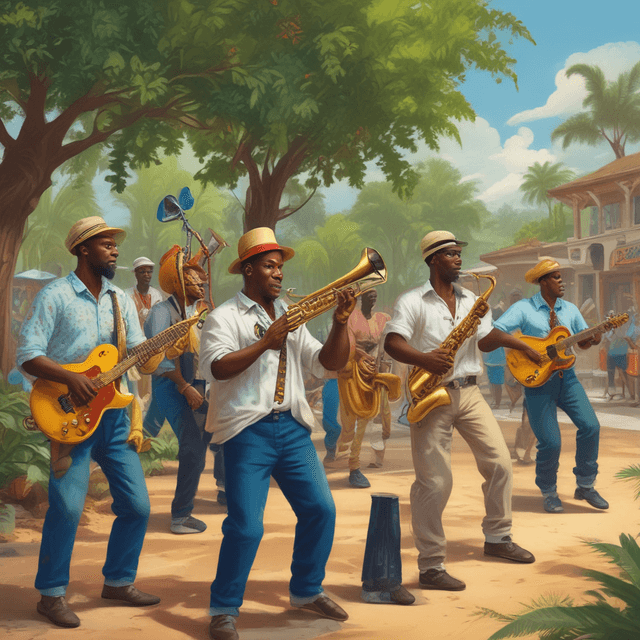
| Origin | |
| Emergence | 1950s |
| Influences | |
| Global spread | Especially popular in Europe |
| Current status | Vibrant and continuously evolving |
| Characteristics | Upbeat rhythm • Strong brass section |
| Associated movements | Rastafarian spiritual and political movement |
| Influence on other genres |
Ska is a music genre that originated in Jamaica in the late 1950s, known for its upbeat tempo, horn section arrangements, and roots in Afro-Caribbean musical styles. Emerging from a blend of mento, calypso, and American jazz and rhythm and blues, ska developed a close association with the Rastafarian spiritual and political movement in Jamaica.
Ska first arose in the late 1950s, as Jamaican producers and musicians experimented with new rhythms and sounds, drawing inspiration from the American genres like jump blues, R&B, and jazz. Early pioneers of the genre included composers and bandleaders like Don Drummond, Roland Alphonso, and Clement "Coxsone" Dodd.
The distinctive upbeat rhythm of ska, often described as a "walking" pace, was developed through the interplay of guitar, bass, drums, and prominent, syncopated horn sections. This sound was a precursor to the later development of reggae and rocksteady in Jamaica during the 1960s.
Crucially, ska also became closely tied to the Rastafarian spiritual and political movement, which was gaining prominence in Jamaica during the post-World War II era. Many ska artists incorporated Rastafarian themes of black empowerment, anti-colonialism, and African repatriation into their lyrics and performances.
In the 1960s and 1970s, ska music began to spread beyond its Jamaican origins, finding particular popularity in Europe, especially in Britain, France, and Germany. This was aided by the migration of Jamaican musicians and the growing popularity of reggae and rocksteady in Europe.
Influential British 2-Tone bands like The Specials, Madness, and The Selecter helped introduce ska to a new generation of listeners, fusing the traditional Jamaican sound with punk rock and new wave sensibilities. This "2-Tone" movement in turn influenced the development of other genres like third wave ska in the United States during the 1980s and 1990s.
Ska's popularity also spread to other parts of the world, including Latin America and East Asia. In these regions, local musicians incorporated ska rhythms and horns into their own musical traditions, creating unique regional variations.
Ska has remained a vibrant and continuously evolving musical style, retaining its connection to Rastafarian culture, social justice movements, and political activism. Newer "waves" of ska emerged in the 1980s, 1990s, and 2000s, blending the traditional sound with elements of punk, pop, and alternative rock.
Today, ska continues to be a global phenomenon, with active scenes and festivals in Jamaica, Europe, North America, and beyond. The genre's emphasis on unity, diversity, and social change has resonated with successive generations of listeners and musicians. Ska's influence can still be heard in the work of contemporary artists spanning multiple musical genres.
Overall, ska's enduring legacy reflects its origins as a grassroots, community-driven movement in Jamaica. Through its global spread and continuous evolution, the genre has maintained its status as a powerful voice for marginalized communities and a vital part of the Jamaican cultural landscape.